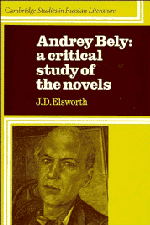2 - Bely and anthroposophy
Published online by Cambridge University Press: 07 October 2011
Summary
It is not hard to understand the appeal of anthroposophy to those who had responded to VI. Solov′yov's idea of creating an integrated culture. It is a uniquely comprehensive doctrine that proposes to reconcile the spiritual and the material, to answer all questions and resolve all contradictions. Without rejecting scientific thought it overcomes materialism and re-asserts, on a rational footing, the spiritual nature of man and the universe. An added appeal to educated Russians must have been the fact that Rudolf Steiner had a high opinion of Solov′yov and extensive familiarity with Russian religious thought, as well as with the whole tradition of Western philosophy.
Bely's introduction to this doctrine did not entail the rejection of anything he had previously believed; he never ceased to regard himself as a Symbolist. Of the other major Symbolists only Maks Voloshin took much sympathetic interest in anthroposophy; Vyacheslav Ivanov had a passing flirtation with it, while Blok, with his abhorrence of abstraction and generalization, remained totally unmoved by it. But many other Russians of Bely's generation, including a number of his personal friends and former ‘Argonauts’, became followers of Rudolf Steiner.
Bely had first read H.P. Blavatskaya's From the Caves and Jungles of Hindustan in 1896 and acquired an interest in ancient oriental philosophy that preceded and led to his later preoccupation with Schopenhauer. His first detailed acquaintance with the doctrines of modern theosophy came in 1901, but he conceived no great liking for it at that time, and avoided theosophical circles until 1908.
- Type
- Chapter
- Information
- Audrey BelyA Critical Study of the Novels, pp. 37 - 54Publisher: Cambridge University PressPrint publication year: 1983
- 1
- Cited by



